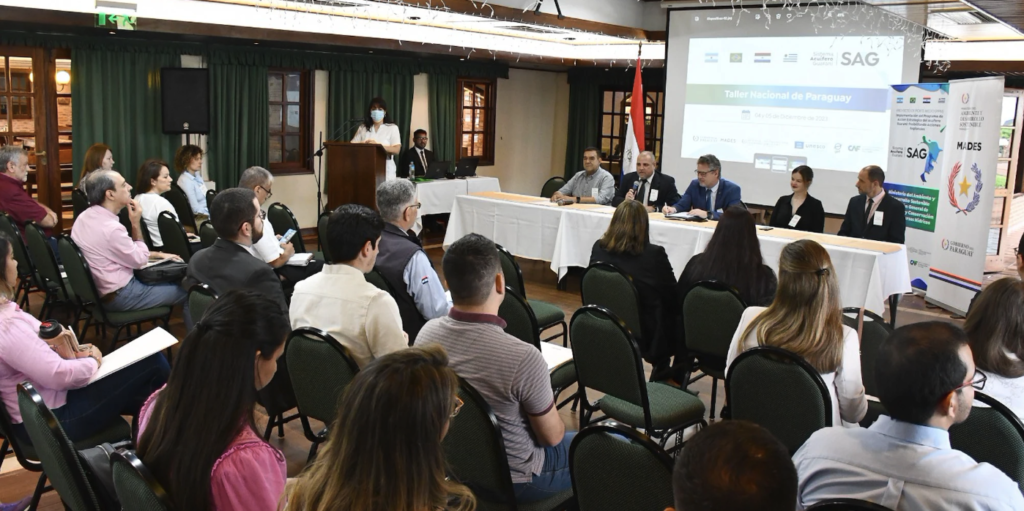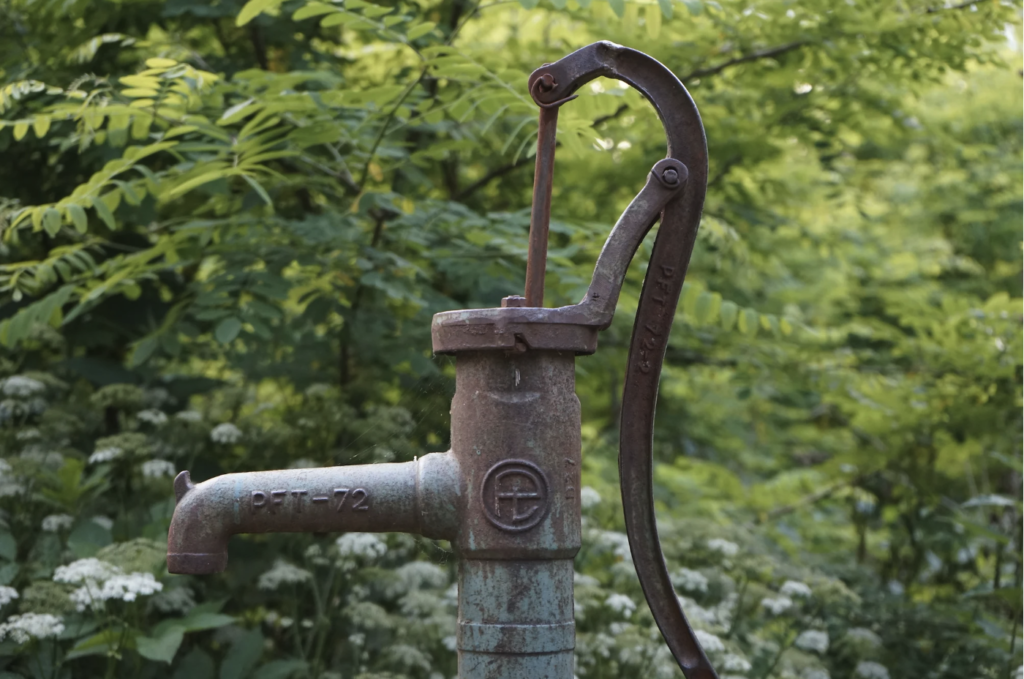In the vastness of South America, between the territories of Argentina, Brazil, Paraguay, and Uruguay, lies an underground treasure that knows no borders or political barriers: the Guarani Aquifer System. This immense freshwater reserve, shared by the four nations, has become a symbol of cooperation and shared challenges, revealing the importance of transboundary management in the modern era.
«The Guarani Aquifer System is more than an underground reservoir. It is a geological testament that connects our nations. To investigate its underground waters is to unravel the secrets of a shared vital resource. This investigation not only reveals the mysteries of the Earth but also illuminates the path towards sustainability and transboundary cooperation»
states Miguel Doria, Regional Hydrological Specialist for Latin America and the Caribbean at the UNESCO Montevideo Regional Office. Knowing it becomes imperative.
The underground heart of South America
The Guarani Aquifer System (GAS), considered one of the largest underground water deposits in the world, extends under an area of more than one million square kilometers. This vast aquifer system hides at depths that defy the imagination, uniting countries that share the wealth of its waters. However, its magnitude also raises crucial questions about how to preserve and use this vital resource sustainably.
Faced with these challenges, the four countries have proposed a response: The Medium Size Project “Implementation of the Guarani Aquifer Strategic Action Program: Enabling Regional Actions”.
“This Project has the objective of implementing the technical coordination frameworks and regional management tools provided in the Strategic Action Program (SAP) for the coordinated and harmonized implementation of priority actions at the national and international level, that will ensure the long-term sustainability of the Guarani Aquifer System. This is intended to enhance water security considering the impacts of future climate scenarios, the protection of the ecosystem services provided by the aquifer, and gender equality and empowerment of women,”
says its International Coordinator, Ricardo Burg.

The Project, which began in July 2022, has made significant progress, with a particular emphasis on coordinated work between the four countries.
«The dialogue and exchange within the framework of the countries allows us to jointly define the priorities and the steps to follow to update the SAP and continue moving forward with determination in the transboundary management of the Guarani Aquifer System,»
states Ernesto Fernández Polcuch, Director of the UNESCO Montevideo Regional Office.
In these first 18 months of execution, the countries reviewed «the current and future scenarios of the GAS, good practices in the territory, its management and the focus on knowledge production and capacity development» highlights Burg.
The challenge of transboundary cooperation
The Guarani Aquifer System is the first aquifer in Latin America to have an agreement for transboundary management. As water demand increases in the region, the need for coordinated management becomes more pressing. Argentina, Brazil, Paraguay, and Uruguay have embarked on a joint journey to safeguard this shared treasure. Transboundary cooperation has become necessary, and nations have come together to address common challenges like overexploitation, pollution, and climate change.
To advance the institutionalization of transboundary cooperation, national coordination and three specialized committees were established: Monitoring and Modeling Committee, Training, Participation and Dissemination Committee, and Steering Committee, with representatives from all GAS countries. These committees coordinate the joint implementation of strategic actions according to the Strategic Action Program and its update.

The engineering of water diplomacy
In this journey towards the sustainable management of the Guarani Aquifer System, scientists and diplomats have become the architects of water diplomacy. Developing a common regulatory framework, sharing scientific data, and coordinating conservation strategies are crucial. Through negotiations and agreements, these experts are working together to ensure equitable and sustainable access to groundwater.
Concrete steps have been taken to respond to some of these challenges by monitoring the Aquifer System: A Monitoring Network has been designed, establishing the parameters for the analysis and monitoring of 35 wells in the four GAS countries (thirty existing wells and five new ones). The contracting processes for the drilling of these five new wells distributed in Argentina, Paraguay, and Uruguay are in progress, in addition to the contracting process of the laboratories that will analyze all of the wells, which strengthens the foundations for its efficient management.
Challenges and opportunities
Despite joint efforts, the path to effective management of the Guarani Aquifer System is not without challenges. Population growth pressures, agricultural expansion, and industrial activities pose constant threats. Nevertheless, there are also opportunities for sustainable development, joint research, and investment in technologies that minimize environmental impact.
To jointly address these challenges, progress has been made in the update of the Strategic Action Program through national workshops that brought together stakeholders from the four countries to analyze the current situation of the GAS and propose strategies for better management. The participation of academia, governments, NGOs, and indigenous peoples, among other actors, ensured a comprehensive vision. These workshops are crucial for updating the SAP and fostering a sense of belonging among the various stakeholders.

«At the heart of the management of the Guarani Aquifer System, intercultural dialogues are the rivers that connect our ancestral knowledge with the needs of the present. As an indigenous leader, I understand that preserving this shared treasure implies a deep respect for the land and collaboration that transcends political borders. In these dialogues, we find the balance between the wisdom of our ancestors and the responsibility of ensuring a sustainable future for future generations»
highlighted one of the Guarani indigenous leaders and defenders of environmental rights who participated in one of the National dialogues on the Future of the Guarani Aquifer System held in Posadas, Argentina.
Pablo Storani, National Coordinator of Argentina for the GAS, highlighted the need to
“Generate the conditions to improve the enabling environment for transboundary cooperation: strengthening local and regional institutions and capacities, implementing the monitoring system, improving multi-factor interaction, establishing a solid participatory base with agile and reliable information exchange among other actions.”
In this sense, Burg stated that it is necessary to
«Know the good practices in the territory that have been carried out around the pilot project, to learn from them and introduce the necessary improvements in the new approaches to transboundary water management.»
The National Coordinator of Uruguay, Ximena Lacués, enunciated that
“The Guarani Aquifer System is an important resource for Uruguay due to the diverse use that is given to it. We have already been monitoring the aquifer system in the outcrop area, but this Project will allow us to continue these actions and improve the transboundary cooperation with the countries we share this source with. We also think this is a great chance to share the new data and outcomes with all the actors involved and all society”.
“This Project is aimed to promote actions of much greater impact for the sustainable management of the Guarani Aquifer System. Some of the main objectives are to strengthen the knowledge of the Guarani Aquifer System in society and to create an information system for the monitoring of wells and its subsequent automation. Good coordination between the countries is key for the proper management of the system” stated David Fariña, the National Coordinator of Paraguay.
In addition, the National Coordination of Brazil, Claudia Ferreira Lima, highlighted that
«The transboundary cooperation Project on the Guarani Aquifer System contributes to the difficult task of showing the population the intrinsic and strategic value of this asset, which remains little studied.»
A sustainable future for the Guarani Aquifer System
As transboundary management of the Guarani Aquifer System advances, the region is weaving a success story in preserving this crucial natural resource. The collaboration between Argentina, Brazil, Paraguay, and Uruguay benefits current generations and lays the foundations for a future where sustainability and respect for the environment are the cornerstones of development.
Rene Gomez-Garcia from CAF remarks,
«Transboundary water bodies require the best instruments for sound integrated management and the Guarani Aquifer System shows us every day a broader perspective for the benefit of every nation; it is an act of cooperation that transcends borders, strengthening the existing instruments and creating new ones in benefit of Argentina, Brazil, Paraguay, and Uruguay in a shared commitment to sustainable development and effective integration. In this era of global challenges, recognizing the strategic importance of this underground resource is crucial to achieving the Sustainable Development Goals, building bridges of understanding and sustainability through water cooperation».
Beyond the borders
The Guarani Aquifer System is a tangible reminder that nature does not recognize artificial borders. In managing this invaluable source of life, these nations are writing a story that transcends politics and highlights the importance of working together to protect our shared resources. The Guarani Aquifer System is not only an underground water reservoir, it is the bond that unites these nations in a shared history of preservation and collaboration.
About the project
The purpose of this project is to help the countries accelerate the implementation of the regional actions proposed in the Strategic Action Plan. Additionally, to establish the technical coordination frameworks and tools essential for the long-term sustainability of the resource and to comply with the provisions of the Guarani Agreement.
The GEF grant fund was managed through the Development Bank of Latin America (CAF), as an Implementing Agency, and it has been agreed that the international Executing Agency will be UNESCO, through its Regional Science Office in Montevideo, which administers the funds and has set up a Project Coordination Unit (PCU), with the technical support of the Regional Center for Groundwater Management (CeReGAS).
For more information on the project, please contact the Project Coordination Unit (ppmguarani@unesco.org) or visit the project page on iwlearn.net
